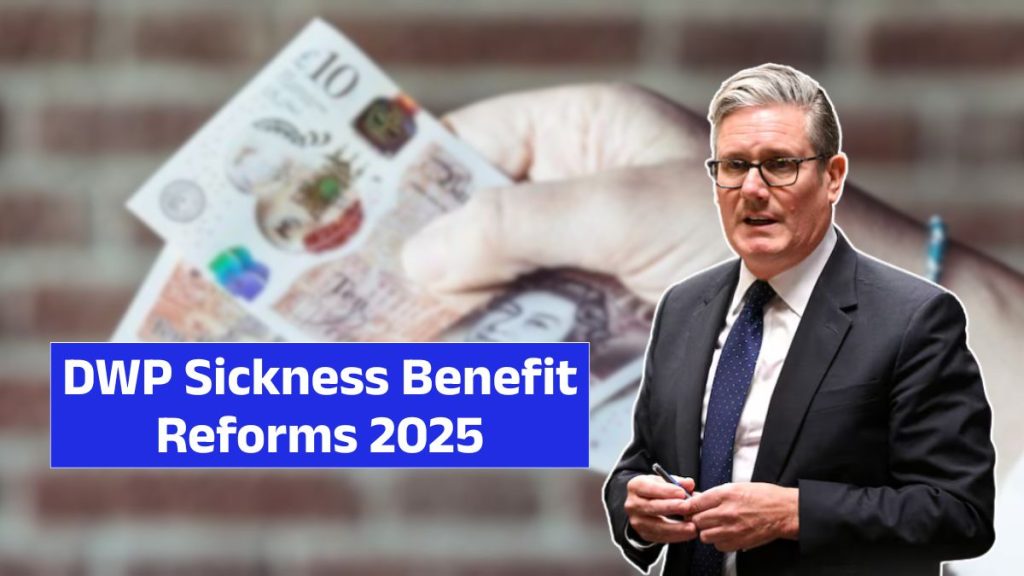The Department for Work and Pensions (DWP) has confirmed a sweeping reform of sickness benefits that will take effect in 2025. These changes are set to impact hundreds of thousands of claimants across the UK who depend on financial support due to illness, disability, or long-term health conditions.
For many, sickness benefits provide a crucial lifeline—helping them meet daily costs when work is not possible. With the upcoming reforms, the government aims to modernise the system, improve fairness, and encourage more people back into employment wherever feasible.
What Are Sickness Benefits?

Sickness benefits are designed to offer financial protection for individuals unable to work due to health-related conditions. These include:
- Statutory Sick Pay (SSP): Paid by employers for short-term sickness.
- Employment and Support Allowance (ESA): Provided to those unable to work for longer periods.
- Universal Credit (UC): May include sickness-related support for those unfit for work.
Together, these benefits act as a safety net, ensuring people can still cover essentials such as food, rent, and utilities when their health prevents them from earning.
Why Are Reforms Being Introduced in 2025?
The government argues that the current system is outdated, costly, and often ineffective in helping people transition back into work.
A recent review highlighted:
- Inconsistent assessments leading to unfair outcomes.
- Long payment delays causing financial strain.
- Confusion among claimants over eligibility rules.
- Rising claims, particularly after the COVID-19 pandemic, putting pressure on welfare budgets.
The 2025 reforms aim to simplify processes, reduce misuse, and ensure support is better targeted at those who need it most.
Key Changes to Statutory Sick Pay (SSP)
Currently, Statutory Sick Pay is available for up to 28 weeks. From 2025, the system will undergo significant updates:
- Extended coverage: More low-income workers, who previously fell below earnings thresholds, will now qualify.
- Digital reporting: Claim processes will shift online, reducing paperwork and delays.
- Faster payments: Modernised systems will speed up processing times.
- Employer responsibility: Businesses must adopt better reporting systems to prevent disputes and ensure smoother claims.
This expansion will make SSP more inclusive, especially for workers in part-time, flexible, or gig economy roles.
Changes to Employment and Support Allowance (ESA)
ESA reforms focus on modernising medical assessments and simplifying claimant categories:
- Assessments redesigned: Greater weight will be given to medical evidence from GPs and specialists.
- Focus on ability: Evaluations will highlight what claimants can do, not just what they cannot.
- Simplified groups: The current support group structure will be reduced to make outcomes clearer.
- Early support: Claimants may be linked with training, rehabilitation, or employment programmes earlier.
The goal is to strike a balance between security for the unwell and opportunities for recovery or re-employment.
Universal Credit and Sickness Claims
As Universal Credit continues to replace older benefits, its sickness-related elements will also be updated:
- Aligned rules: UC will reflect the new sickness criteria for consistency.
- Fewer delays: Work Capability Assessments under UC will be streamlined.
- Digital uploads: Claimants can submit medical evidence online securely.
- Health support plans: Tailored packages will assist claimants in managing recovery while receiving financial help.
These changes are intended to make the UC process more transparent and less stressful for applicants.
Reforming Work Capability Assessments (WCA)
The Work Capability Assessment (WCA) determines whether someone is fit for work, has limited capacity, or cannot work at all. From 2025:
- Shorter assessments: Designed to reduce delays.
- Medical evidence prioritised: GP and specialist records will carry more weight than DWP-only assessors.
- Fast-tracking: Claimants with severe or long-term conditions will bypass unnecessary reassessments.
This shift is expected to make WCAs more compassionate and accurate, reducing stress for vulnerable individuals.
Impact on Claimants
The reforms will bring mixed outcomes for claimants.
Positive impacts include:
- Faster decision-making.
- Fewer reassessments for severe conditions.
- Extended SSP eligibility for low-income workers.
- More personalised employment and health support.
Challenges may include:
- Stricter eligibility rules.
- Increased expectation for some to engage in work-related activity.
- Potential reduction in entitlement for those reassessed under new criteria.
Claimants must prepare for possible changes to benefit amounts and conditions.
Preparing for the 2025 Reforms
To minimise disruption, claimants should act early:
- Update medical records: Keep GP letters, hospital notes, and treatment history current.
- Check new criteria: Review DWP updates to ensure eligibility.
- Set up online access: Many processes will be digital by default.
- Seek guidance: Contact welfare advice groups, local councils, or charities for tailored support.
Being prepared will help avoid delays or missed payments once reforms begin.
Support for Employers
Employers will also face new responsibilities in 2025:
- Improved reporting systems to meet DWP requirements.
- Digital integration for sickness claims.
- Workplace adjustments: Encouraged to provide phased returns or flexible options for staff with long-term conditions.
- Penalties: Businesses failing to comply with updated SSP rules may face enforcement action.
Employers are urged to review internal policies now to stay compliant.
Concerns from Charities and Campaigners
Not everyone agrees with the reforms. Several disability rights groups and charities have raised concerns:
- Stricter rules could disadvantage vulnerable claimants.
- Pressure to return to work may risk worsening health conditions.
- Some individuals may fall through the cracks without adequate safeguards.
Campaigners are calling for strong protections to ensure no one is unfairly penalised. In response, the government has promised to monitor the reforms closely and adjust policies if necessary.
5 FAQs
Q1: What are sickness benefits in the UK?
A: Sickness benefits include Statutory Sick Pay, Employment and Support Allowance, and Universal Credit support for those unable to work due to health conditions.
Q2: When will the new reforms take effect?
A: The changes will officially roll out in 2025, affecting SSP, ESA, UC, and Work Capability Assessments.
Q3: How will Statutory Sick Pay change under the reforms?
A: SSP will be extended to cover more low-income workers, with faster digital reporting and improved employer responsibility.
Q4: What is happening to Work Capability Assessments?
A: WCAs will be shorter, more evidence-based, and less reliant on repeated reassessments, particularly for severe conditions.
Q5: Will some people lose entitlement under the new rules?
A: Yes, stricter eligibility and updated assessments could mean some claimants receive reduced support or are expected to engage in work-related activity sooner.















